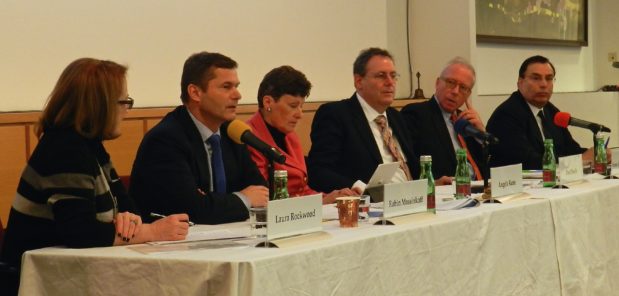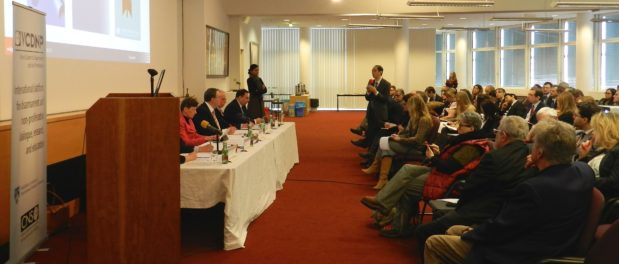
On 30 January 2017, the VCDNP, in cooperation with the Permanent Mission of Japan to the International Organizations in Vienna, hosted the launch of a report on disarmament and cooperative security, published jointly by the Stockholm Peace Research Institute (SIPRI) and the Centre for International Studies & Diplomacy at SOAS, University of London. Reintroducing Disarmament and Cooperative Security to the Toolbox of 21st Century Leaders is a collection of essays that examines the current international security context and how disarmament fits in it, and explores the opportunities for cooperative security and disarmament measures to contribute to the resolution of various security issues.
In introducing the report to an audience of approximately a hundred participants, Dan Plesch, Director of the Centre for International Studies and Diplomacy at SOAS and one of the report’s co-editors, noted that high interest in the publication was “a sign of times” – characterized by anxiety about international security. He highlighted mounting interstate tensions, the build-up and modernization of armaments, and the weakening of international cooperative security mechanisms as growing challenges, and warned that a “business as usual” approach to security, with little attention paid to arms control and disarmament, was not sustainable. It was necessary, he argued, not to view disarmament simply as a matter of rhetoric or political necessity but to learn from, and build on, past successes in disarmament and cooperative security.

VCDNP Senior Fellow Angela Kane introduced the chapter she co-authored with VCDNP Senior Research Associate Jenny Nielsen, which discusses how the concept of global strategic stability has remained static despite important technological changes taking place since the end of the Cold War. Technological advances in cyberwarfare, conventional weapons, additive manufacturing and other areas, the authors argue, pose new challenges for strategic stability that is still conceptualized in terms of reliance on nuclear deterrence. Ms. Kane further underscored that the majority of States in the world do not attach value to nuclear deterrence, as evidenced by the recent focus on the humanitarian impact of nuclear weapons and the decision to convene negotiations on a nuclear weapons prohibition in March 2017. Since touting the security benefits of nuclear weapons is becoming unsustainable, she suggested that the mounting pressure might push the nuclear-weapon States toward a substantive dialogue on security issues, including the possibility of transforming strategic arms control from bilateral to multilateral. A dialogue is indeed necessary, she concluded, if the international community is to construct an alternative framework to strategic stability.
Picking up on the subject of value and viability of nuclear deterrence, Ambassador Franz Josef Kuglitsch, Director of Disarmament, Arms Control and Non-Proliferation at the Austrian Federal Ministry for Europe, Integration and Foreign Affairs, observed that the risk of nuclear-weapons use is higher in a multipolar world. While there is a pressing need to mitigate the risks and strengthen the taboo against the use of nuclear weapons, a comprehensive nuclear weapons convention is not achievable in the near future. In this context, Ambassador Kuglitsch argued that the negotiation of a nuclear weapons prohibition was within reach, as a first step in the direction of eliminating nuclear weapons. He emphasized that the Nuclear Non-Proliferation Treaty (NPT) remained a viable and central instrument of the non-proliferation and disarmament regime, while the prohibition negotiations presented an opportunity to revive the discussion on nuclear deterrence. He therefore appealed to all States to seize this opportunity for a dialogue and participate in the upcoming negotiations.
Robin Mossinkoff, Head of the Forum for Security Cooperation at the Organization for Security and Cooperation in Europe (OSCE), suggested that the diplomatic community working on nuclear issues could benefit from the OSCE’s toolbox, such as confidence- and security-building measures. While noting the stagnation in conventional arms control and NATO-Russia dialogue, he also highlighted the OSCE’s ability to come to an agreement on several issues, such as cyberspace security. While the Vienna Document on Confidence- and Security-Building Measures and Open Skies Treaty remain useful working instruments for transparency and risk reductions, the speaker highlighted that a new impetus was needed for States to reengage on the modernization of the OSCE politico-military toolbox. The Ministerial Declaration on the Framework for Arms Control concluded in Hamburg in December 2016 provides an opportunity to launch a structured dialogue that could lead to such reengagement.
Tariq Rauf, Director of SIPRI’s Disarmament, Arms Control and Non-Proliferation Programme and co-editor of the report, concluded the panel’s presentations with a review of major trends and challenges in international security. Among these are the deadlock in the US‑Russian arms control, an arms race in South Asia, rise of nationalism and isolationism in a number of States around the world, failure to engage with North Korea on stopping its nuclear weapons program, potential admission of non-NPT nuclear-armed States into the Nuclear Suppliers Group and the stalemate in the debate on the security of nuclear material in military programs. He particularly highlighted technological advances that have the potential to blur the distinction between conventional and nuclear weapons as undermining traditional nuclear deterrence and increasing the risk of nuclear-weapons use.
During the exchange with the audience that followed the presentations, academics and members of the diplomatic community asked questions regarding the implications of the nuclear-weapons prohibition negotiations, the applicability of OSCE lessons to other regions and the challenges of informing the public about nuclear security and arms control issues.
